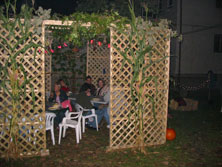 …On the fifteenth day of this seventh month is the Festival of Sukkot, seven days for the L-RD. -Leviticus 23:34
…On the fifteenth day of this seventh month is the Festival of Sukkot, seven days for the L-RD. -Leviticus 23:34
The Festival of Sukkot begins on Tishri 15, the fifth day after Yom Kippur; this year it falls on September 23. It is a drastic transition, from the most solemn holiday in the year to one of the most joyous. Sukkot is so joyful that it is commonly referred to as Z’man Simchateinu, the Season of our Rejoicing.
Sukkot is the last of the three pilgrimage festivals. Like Passover and Shavu’ot, Sukkot commemorates the forty-year period during which the children of Israel were wandering in the desert, living in temporary shelters. Sukkot is also a harvest festival and is sometimes referred to as Chag Ha-Asif, the Festival of Ingathering.
The word “Sukkot” means “booths,” and refers to the temporary dwellings that we are commanded to live in during this holiday in memory of the period of wandering. Sukkot lasts for seven days. The two days following the festival, Shemini Atzeret and Simchat Torah, are separate holidays but are related to Sukkot and are commonly thought of as part of Sukkot.
In honor of the holiday’s historical significance, we are commanded to dwell in temporary shelters, as our ancestors did in the wilderness. The temporary shelter is referred to as a sukkah (which is the singular form of the plural word “sukkot”).
It is a time of thanksgiving for the fruit harvest as Sukkot comes at the completion of the harvest; it is regarded as a general thanksgiving for the bounty of nature in the year that has passed.
The sukkah is great fun for the children. Building the sukkah each year satisfies the common childhood fantasy of building a fort, and dwelling in the sukkah satisfies a child’s desire to camp out in the backyard. The commandment to “dwell” in a sukkah can be fulfilled by simply eating all of one’s meals there; however, if the weather, climate, and one’s health permit, one should spend as much time in the sukkah as possible, including sleeping in it.
No matter how you celebrate Sukkot remember it is a time of remembering how G-D provides for us and a time to be joyful in His provision.